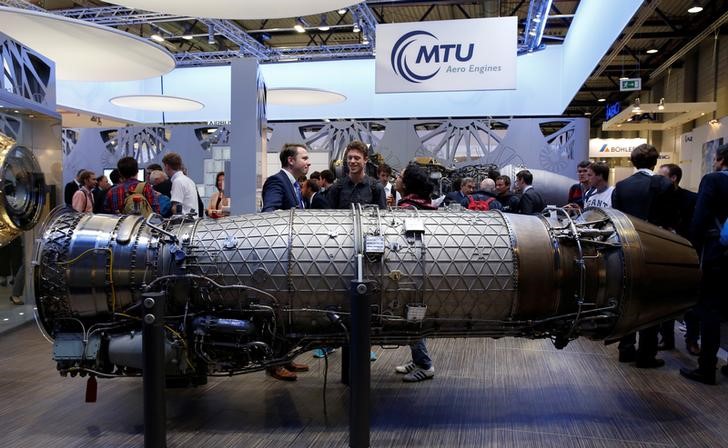Investing.com -- RBC Capital Markets has initiated coverage of German aerospace manufacturer MTU Aero Engines AG with a “sector perform” rating and a €360 price target, noting the company is fairly valued despite attractive market exposures, in a note dated Tuesday. At the current share price of €356.80, upside is limited to approximately 2%.
MTU benefits from exposure to civil aerospace OEM activity, maintenance, repair and overhaul (MRO), and defense markets.
RBC forecasts a 10.6% CAGR in sales through 2030, exceeding the peer average of 8%. The MRO division, which contributed 67% of 2024 revenues, is driving growth but remains a lower-margin business, resulting in forecasted EBITA growth of 8%, slightly below the peer 10%.
RBC anticipates free cash flow (FCF) inflection starting 2026-27 after geared turbofan (GTF) compensation payments decline. FCF yield is projected at 1.8% in 2025, rising to 2.8% in 2026 and 5.5% by 2029.
However, guidance lacks granularity compared to peers, creating medium-term uncertainty.
MTU’s 2030 growth and margin targets, provided at the June 2025 Paris Airshow, are achievable according to RBC, even with the current €/$ exchange rate at 1.16 versus the assumed 1.10.
The PW1100G engine for A320neo accounts for 41% of commercial OEM revenues in 2026-27, with the PW1500G for A220 adding 17%.
A powdered metal quality issue on engines built 2015-21 has required inspections and shop work, costing MTU approximately €1 billion.
Cash outflows of €390 million occurred in 2024 and 2025, with remaining payments due in 2026. RBC notes slight risk of program impacts extending to 2027 but partners reaffirm current cost plans.
RBC’s €360 target reflects a 2029 FCF yield of 5.5%, in line with engine peers. MTU trades at 15.9x EV/EBITA and 12.1x EV/EBITDA for 2026, versus peer averages of 21x and 17x. FCF yield in 2026 is 2.8% versus 3.2% peer average, improving to 5.5% by 2029, slightly above peers at 5.2%.
In 2024, commercial engines accounted for 25% of revenue, military engines 8%, and MRO 67%. Geographically, 70% of sales came from North America, followed by Germany (10%) and Asia (9%).
GTF-related revenues comprised 30-35% of 2024 sales, projected to rise to 40% in 2025. RBC expects no major revenue cliff post-2026, as ongoing MRO demand sustains activity.
Drivers include flight-hour growth, OE deliveries, strong pricing amid supply constraints, MRO footprint expansion, and European military spending. MTU leads in Germany’s military engine management, notably on the Eurofighter EJ200 (33% share), Tornado RB199, A400M TP400, and Next European Fighter Engine.
Independent service licenses for LEAP, GEnx, and GE90 engines are expected to generate about 6,000 lifetime shop visits ( around $120 billion revenue).
MTU returned 16% over 1 year, underperforming peers and the global aerospace universe. On a 10-year horizon, the company returned 321%, outperforming the sector average of 149%.
RBC highlights continued organic growth at 9-11% CAGR over 2006-25. Margin progression is expected to be constrained by MRO mix, offsetting peak OEM profitability.
